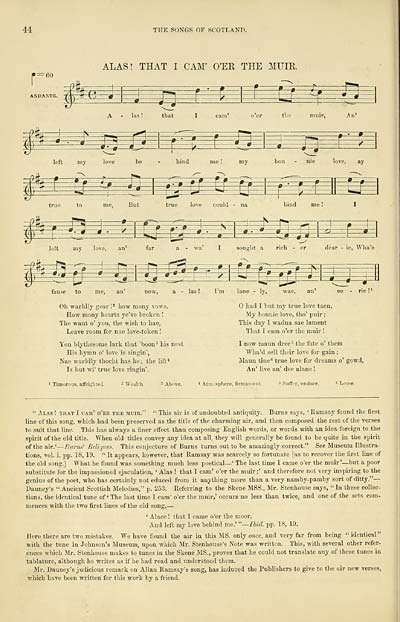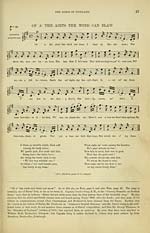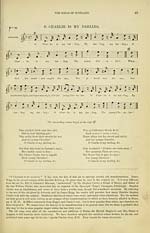Glen Collection of printed music > Printed music > Wood's edition of the songs of Scotland
(68) Page 44 - Alas! That I cam' o'er the muir
Download files
Complete book:
Individual page:
Thumbnail gallery: Grid view | List view

44
THE SONGS OF SCOTLAND.
: 60
P
ALAS! THAT I CAM' O'ER THE MUIE.
fe
S
S
&
las!
that
tlic
An'
*E=£e3 e
m
left
my
love
be
hind
my
bon
love, ay
£
l^g
S
: F-#
a
s
u=
But
true love could
bind
£*
£=P=f
feEE^
s
2t
^=£j£
left
my love, an'
far
a - wa
sought a rich - er
dear - ie, Wha's
■fc=S=^
P=F
^£?=sl
=PF^=3=
=E=£
=f=P=
>:
s
^p
fause to me, an' now,
Oh warldly gear! 5 how mony vows,
How mony hearts ye've broken !
The want o' you, the wish to hae,
Leave room for nae love-token !
Yon blythesome lark that 'boon 3 his nest
His hymn o' love is singin',
Nae warldly thoeht has he; the lift 4
Is but wi' true love ringin'.
las ! I'm lane - ly,
wae,
had I but my true love taen,
My bonnie love, tho' puir ;
This day I wadna sae lament
That I cam o'er the muir !
1 now maun dree 5 the fate o' them
Wha'd sell their love for gain ;
Maun tine 6 true love for dreams o' gowd,
An' live an' dee alane !
1 Timorous, affrighted.
2 Wealth.
1 Atmosphere, firmament.
5 Suffer, endure.
" Alas ! that I cam' o'er the muir." " This air is of undoubted antiquity. Burns says, ' Ramsay found the first
line of this song, which had been preserved as the title of the charming air, and then composed the rest of the verses
to suit that line. This has always a finer effect than composing English words, or words with an idea foreign to the
spirit of the old title. When old titles convey any idea at all, they will generally be found to be quite in the spirit
of the air.' — Burns' Reliques. This conjecture of Burns turns out to be amazingly correct." See Museum Illustra-
tions, vol. i. pp. 18, 19. " It appears, however, that Ramsay was scarcely so fortunate [as to recover the first line of
the old song.] AVhat he found was something much less poetical — ' The last time I came o'er the muir' — but a poor
substitute for the impassioned ejaculation, ' Alas ! that I cam' o'er the muir;' and therefore not very inspiring to the
genius of the poet, who has certainly not educed from it anything more than a very namby-pamby sort of ditty." —
Dauney's " Ancient Scottish Melodies," p. 253. Referring to the Skene MSS., Mr. Stenhouse says, " In these collec-
tions, the identical tune of ' The last time I cam' o'er the muir,' occurs no less than twice, and one of the sets com-
mences with the two first lines of the old song, —
' Alace ! that I came o'er the moor,
And left my love behind me.' " — Ibid. pp. 18, 19.
Here there are two mistakes. We have found the air in this MS. only once, and very far from being " identical"
with the tune in Johnson's Museum, upon which Mr. Stenhouse's Note was written. This, with several other refer-
ences which Mr. Stenhouse makes to tunes in the Skene MS., proves that he could not translate any of these tunes in
tablature, although he writes as if he had read and understood them.
Mr. Dauney's judicious remark on Allan Ramsay's song, has induced the Publishers to give to the air new verses,
which have been written for this work by a friend.
THE SONGS OF SCOTLAND.
: 60
P
ALAS! THAT I CAM' O'ER THE MUIE.
fe
S
S
&
las!
that
tlic
An'
*E=£e3 e
m
left
my
love
be
hind
my
bon
love, ay
£
l^g
S
: F-#
a
s
u=
But
true love could
bind
£*
£=P=f
feEE^
s
2t
^=£j£
left
my love, an'
far
a - wa
sought a rich - er
dear - ie, Wha's
■fc=S=^
P=F
^£?=sl
=PF^=3=
=E=£
=f=P=
>:
s
^p
fause to me, an' now,
Oh warldly gear! 5 how mony vows,
How mony hearts ye've broken !
The want o' you, the wish to hae,
Leave room for nae love-token !
Yon blythesome lark that 'boon 3 his nest
His hymn o' love is singin',
Nae warldly thoeht has he; the lift 4
Is but wi' true love ringin'.
las ! I'm lane - ly,
wae,
had I but my true love taen,
My bonnie love, tho' puir ;
This day I wadna sae lament
That I cam o'er the muir !
1 now maun dree 5 the fate o' them
Wha'd sell their love for gain ;
Maun tine 6 true love for dreams o' gowd,
An' live an' dee alane !
1 Timorous, affrighted.
2 Wealth.
1 Atmosphere, firmament.
5 Suffer, endure.
" Alas ! that I cam' o'er the muir." " This air is of undoubted antiquity. Burns says, ' Ramsay found the first
line of this song, which had been preserved as the title of the charming air, and then composed the rest of the verses
to suit that line. This has always a finer effect than composing English words, or words with an idea foreign to the
spirit of the old title. When old titles convey any idea at all, they will generally be found to be quite in the spirit
of the air.' — Burns' Reliques. This conjecture of Burns turns out to be amazingly correct." See Museum Illustra-
tions, vol. i. pp. 18, 19. " It appears, however, that Ramsay was scarcely so fortunate [as to recover the first line of
the old song.] AVhat he found was something much less poetical — ' The last time I came o'er the muir' — but a poor
substitute for the impassioned ejaculation, ' Alas ! that I cam' o'er the muir;' and therefore not very inspiring to the
genius of the poet, who has certainly not educed from it anything more than a very namby-pamby sort of ditty." —
Dauney's " Ancient Scottish Melodies," p. 253. Referring to the Skene MSS., Mr. Stenhouse says, " In these collec-
tions, the identical tune of ' The last time I cam' o'er the muir,' occurs no less than twice, and one of the sets com-
mences with the two first lines of the old song, —
' Alace ! that I came o'er the moor,
And left my love behind me.' " — Ibid. pp. 18, 19.
Here there are two mistakes. We have found the air in this MS. only once, and very far from being " identical"
with the tune in Johnson's Museum, upon which Mr. Stenhouse's Note was written. This, with several other refer-
ences which Mr. Stenhouse makes to tunes in the Skene MS., proves that he could not translate any of these tunes in
tablature, although he writes as if he had read and understood them.
Mr. Dauney's judicious remark on Allan Ramsay's song, has induced the Publishers to give to the air new verses,
which have been written for this work by a friend.
Set display mode to: Large image | Transcription
Images and transcriptions on this page, including medium image downloads, may be used under the Creative Commons Attribution 4.0 International Licence unless otherwise stated. ![]()
| Special collections of printed music > Glen Collection of printed music > Printed music > Wood's edition of the songs of Scotland > (68) Page 44 - Alas! That I cam' o'er the muir |
|---|
| Permanent URL | https://digital.nls.uk/91338559 |
|---|
| Description | Scottish songs and music of the 18th and early 19th centuries, including music for the Highland bagpipe. These are selected items from the collection of John Glen (1833 to 1904). Also includes a few manuscripts, some treatises, and other books on the subject. |
|---|
| Description | The Glen Collection and the Inglis Collection represent mainly 18th and 19th century Scottish music, including Scottish songs. The collections of Berlioz and Verdi collected by bibliographer Cecil Hopkinson contain contemporary and later editions of the works of the two composers Berlioz and Verdi. |
|---|

